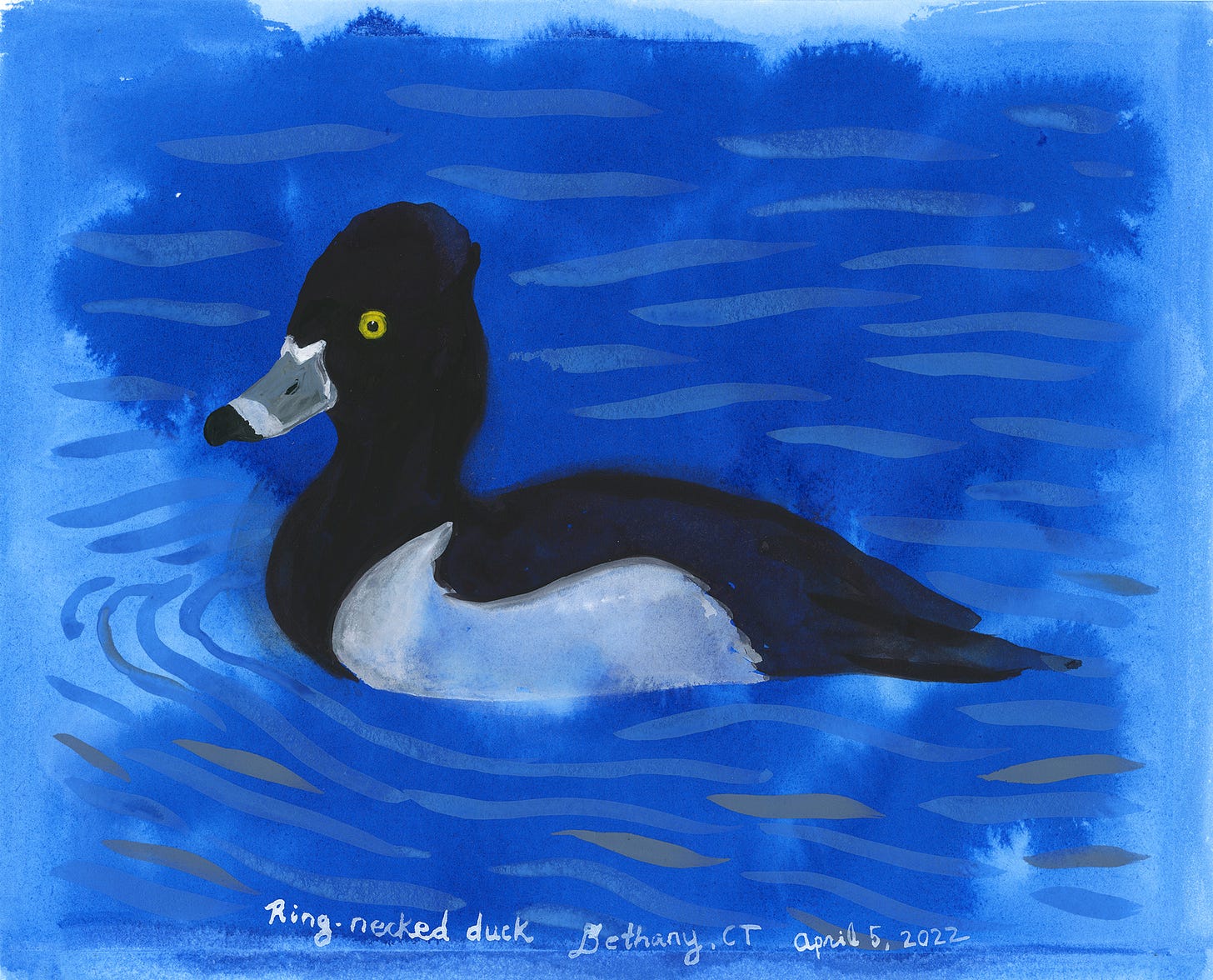Hi, friends — this is your semimonthly newsletter about animal encounters, welcome to new readers! The full pink moon was last Saturday, and the daffodils are popping here in Connecticut. I like seeing them in strange places. Did someone plant them in that sad ditch? Or maybe the flowers found their own way. In either case, it’s a nice gesture—a person or the earth delivering a bouquet. It’s still cold but the bright moments, including the week the ring-necked ducks came to town, are irresistible. As always, you can reply to this email or add a comment on the website. I’d love to hear your stories. What animals have you seen? — Amy Jean
There’s a little pond in town I like to keep light tabs on. The wind blows patterns across its surface and, in spring when all the light breezes are lively, it looks like someone painting wide swaths with a big brush. At any given moment the wind whips up little ripples in at least two directions. You might think the wind should blow in one direction, but it really doesn’t work that way.
On one of these micro-breezy days, I noticed a bunch of dark blotches on the water keeping pace with the ripples. I thought they might be geese, but the blotches were too dainty. A little clump of them floated to the right, sort of peacefully bumper-car bumping into each other. Other stragglers and loners flipped upside down and flapped their legs in the air. Some disappeared underwater, some washed their faces. It was the happiest little duck club in the world. I could have watched them forever.
It turns out they were ring-necked ducks (Aythya collaris), cruising through town on their way north. Some birds migrate individually, but that seems harrowing and lonely to me (ruby-throated hummingbirds cross the Gulf of Mexico alone). What is it like to be a duck in a flock? What is it like to have duck friends and duck foes? I think it is a good thing to spend a few minutes pondering the inner life of a duck.
Ring-necked ducks are a handsome bird with a tufted head. They are one of the diving ducks and actually swim underwater, propelling themselves with their webbed feet in search of food (submerged plants and bugs, whole mollusks). They like to stop over on small freshwater ponds during migration. The group I saw was overwhelmingly male. They swam in a little halo around a female, moving with her to the right and then checking back and moving to the left. She must have been choosing a mate. She seemed to be taking her time.
The ducks are gone now, having left for more northern climes. Canadians take note, they should be in your ponds by now, laying eggs and feathering their nests. The eggs take about a month to hatch, and the ducklings are ready to swim within a day or two. Their mother usually sticks around until they can fly. The little pond here seemed lonely when I watched it today, the wind throwing empty fingers across its surface. A red-tailed hawk swooped low through the trees.
Tomorrow is Earth Day and perhaps we can all put ourselves in a duck’s flappy wet feet for a moment; ponder the life of a small pond; wonder about the math in spring breezes. We don’t know everything, but we are capable of empathy. This imaginative leap is how we begin to make things better (for the planet, the lives of others, and ourselves).
Ring-necked duck links—
Such a handsome little duck; here’s a short video of a male just chillin, floating around a female, acting all nonchalant [AllAboutBirds.org]
I like how the males have these bright yellow surprised eyes, while the females are hazel brown and no-nonsense [Cornell Lab of Ornithology]
The quality of this video is a little weird, but I love their strange calls and watching them dive and disappear [YouTube]
Animal encounters in recent comments—
Lots of bluebird love and if you’ve seen them since please share—we all need more bluebirds in our lives.
Also—
My ring-necked duck is for sale, with some of the proceeds going to the International Fund for Animal Welfare (IFAW).
Wild Life #41 / this newsletter is a place to learn about the life around us, one diving duck at a time. I do this because I’m not sure what to do about the millions of species in danger of extinction. It means something to see and enjoy the life around us. Thanks for reading and sharing. See you next time.






Not unlike Tufted Ducks, which I am more familiar with here in the UK
We get mallards around town here (in Canada! lol) a lot. One of the neater things is sometimes those ducks seem to stay over the winter, or at least return very early. I recall seeing them on small creeks - which run quickly = they don't thoroughly freeze over (vs. a pond) - even when there was much ice and snow around, just enjoying the patches of water they can find. Their downy feathers and duck blubber must be good at keeping them warm out there!